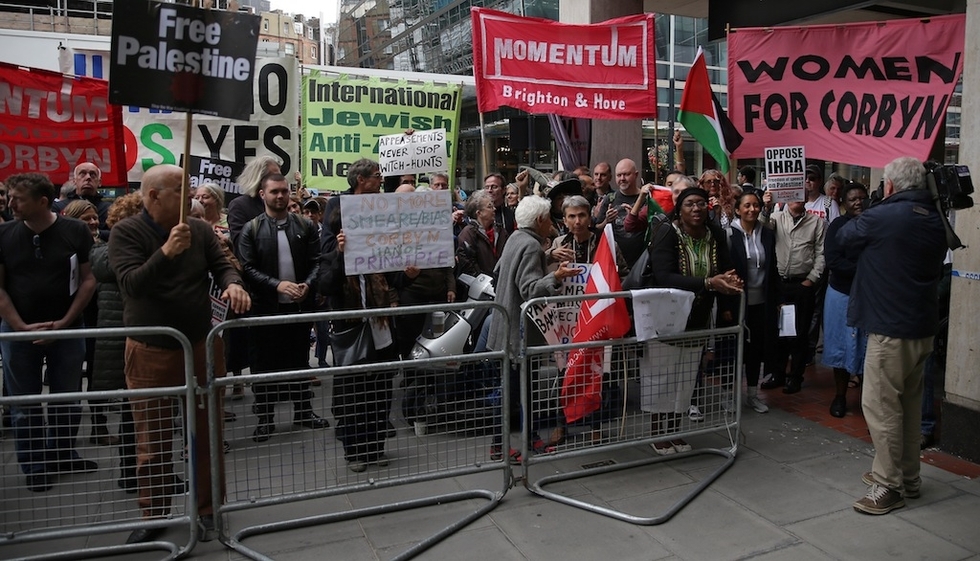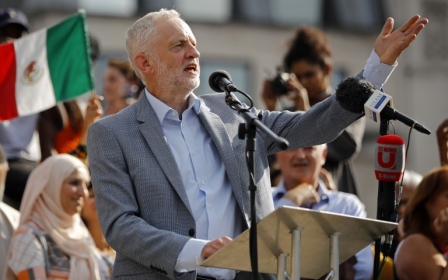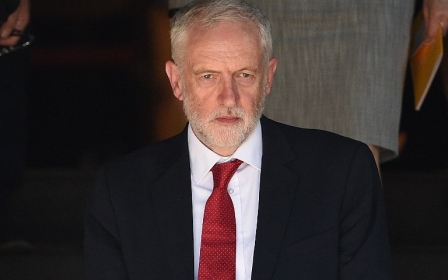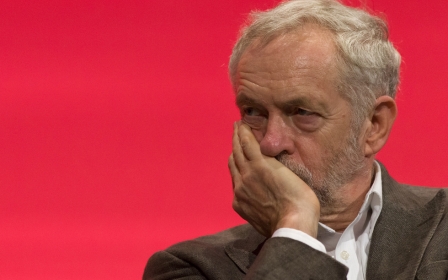UK Labour party adopts IHRA anti-Semitism definition

Britain's opposition Labour Party has adopted controversial guidelines on anti-Semitism at a meeting on Tuesday, in a bid to put to bed a long-running row over allegations of anti-Semitic abuse in the party.
Party leader Jeremy Corbyn spoke at the meeting and read a statement which said it was not anti-Semitic to describe “Israel, its policies or the circumstances around its foundation as racist” - but the meeting did not support his statement.
Rival protesters gathered outside the party's HQ in London as the party's NEC met to decide whether to adopt in full the recommendations of the International Holocaust Remembrance Alliance (IHRA).
Corbyn has come under prolonged attack for refusing to fully adopt the IHRA definition and its guidelines, having argued that they restrict the ability to criticise the state of Israel.
He has also been accused by opponents in the party of allowing anti-Semitism to spread unchecked. His supporters deny the problem has increased since his election as leader and see the row as a means to undermine his leadership.
Corbyn had argued that the definition, adopted by eight countries according to the IHRA and used by many British institutions, does not allow for full criticism of Israel's treatment of Palestinians.
But the party agreed to adopt the IHRA definition in full on Tuesday, alongside a statement emphasising freedom of speech with regards to Israel and Palestinian rights.
Jewish leaders have attacked Corbyn over the anti-Semitism controversies of the past few months.
Former UK chief rabbi Jonathan Sacks on Sunday claimed the majority of Jews were questioning whether Britain was a safe place to bring up their children.
He insisted the Labour leader must "recant and repent" and that he risked engulfing the country "in the flames of hatred".
"Jews have been in Britain since 1656, I know of no other occasion in these 362 years when Jews... are asking 'is this country safe to bring up our children'," he told the BBC.
Palestinian members of the Israeli parliament meanwhile expressed "solidarity" with Corbyn, defending his position on the definition of anti-Semitism.
"When some try to force the Labour party into using as its litmus test a definition of anti-Semitism that goes far beyond anti-Jewish animus to include anti-Zionism, we must raise our voices and decry these efforts," members of the opposition Joint List wrote in a letter to The Guardian.
The Israeli Labor party suspended its ties with Corbyn earlier this year over what it called the UK leader's "hostility" to the Jewish community.
Veteran Labour lawmaker Frank Field, who has sat in the House of Commons for almost 40 years, quit the party's group in parliament Thursday over the mounting anti-Semitism allegations.
In a letter to the party, he said that Corbyn's leadership was overseeing an "erosion of our core values". Field was facing a de-selection battle in his local party before his announcement.
Shadow chancellor John McDonnell defended the Labour leader on Sunday, telling the BBC that critics had "got it wrong".
"Jeremy has made it absolutely clear we will protect Jewish members of our party from any form of abuse and anti-Semitism," he said.
McDonnell predicted all sides would be "satisfied" with the proposals agreed Tuesday.
"It will be resolved, and there will be a balance about acceptance," he said.
Ghada Karmi, Palestinian author and activist, has warned that anti-Palestinian activists had longed push to undermine Corbyn and would not stop their criticisms just because Labour had adopted the IHRA guidelines in full.
"Their contrived anti-Semitism campaign against him, whose aim is to conflate anti-Zionism with anti-Semitism and make criticism of Israel equate to Jew-hatred, is beginning to bear fruit," she wrote for Middle East Eye on Monday.
"The flawed definition of anti-Semitism by the International Holocaust Remembrance Alliance (IHRA), in line with this false equation, is being foisted onto the party, which, if rejected, will invite further accusations of anti-Semitism. If that happens, no amount of backtracking or apology will appease the lobby."
Additional reporting by AFP.
New MEE newsletter: Jerusalem Dispatch
Sign up to get the latest insights and analysis on Israel-Palestine, alongside Turkey Unpacked and other MEE newsletters
Middle East Eye delivers independent and unrivalled coverage and analysis of the Middle East, North Africa and beyond. To learn more about republishing this content and the associated fees, please fill out this form. More about MEE can be found here.




